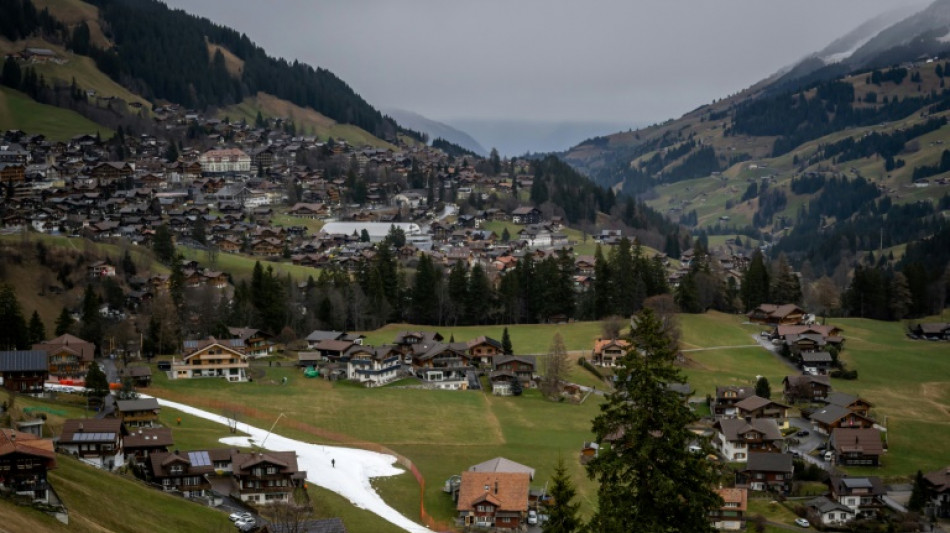
-
 US falling behind on wind power, think tank warns
US falling behind on wind power, think tank warns
-
US news giant CNN eyes 200 job cuts, streaming overhaul

-
 Rubio chooses Central America for first trip amid Panama Canal pressure
Rubio chooses Central America for first trip amid Panama Canal pressure
-
Wall Street's AI-fuelled rally falters, oil slumps

-
 Trump tells Davos elites: produce in US or pay tariffs
Trump tells Davos elites: produce in US or pay tariffs
-
Progressive politics and nepo 'babies': five Oscar takeaways

-
 American Airlines shares fall on lackluster 2025 profit outlook
American Airlines shares fall on lackluster 2025 profit outlook
-
France to introduce new sex education guidelines in schools

-
 Wall Street's AI-fuelled rally falters
Wall Street's AI-fuelled rally falters
-
Drinking water in many French cities contaminated: study

-
 After Musk gesture, activists project 'Heil' on Tesla plant
After Musk gesture, activists project 'Heil' on Tesla plant
-
ICC prosecutor seeks arrest of Taliban leaders over persecution of women

-
 Syria's economy reborn after being freed from Assad
Syria's economy reborn after being freed from Assad
-
Shoppers unaware as Roman tower lurks under French supermarket

-
 Stocks mainly rise after Wall Street's AI-fuelled rally
Stocks mainly rise after Wall Street's AI-fuelled rally
-
Singer Chris Brown sues Warner Bros for $500 mn over documentary

-
 J-pop star Nakai to retire after sexual misconduct allegations
J-pop star Nakai to retire after sexual misconduct allegations
-
Leaky, crowded and hot: Louvre boss slams her own museum

-
 WWF blasts Sweden, Finland over logging practices
WWF blasts Sweden, Finland over logging practices
-
How things stand in China-US trade tensions with Trump 2.0

-
 Most Asian markets rise after Wall Street's AI-fuelled rally
Most Asian markets rise after Wall Street's AI-fuelled rally
-
Fire-hit Hollywood awaits Oscar nominees, with 'Emilia Perez' in front

-
 New rider in town: Somalia's first woman equestrian turns heads
New rider in town: Somalia's first woman equestrian turns heads
-
Most Asian markets extend AI-fuelled rally

-
 Bangladesh student revolutionaries' dreams dented by joblessness
Bangladesh student revolutionaries' dreams dented by joblessness
-
Larry Ellison, tech's original maverick, makes Trump era return

-
 Political crisis hits South Korea growth: central bank
Political crisis hits South Korea growth: central bank
-
Photonis Launches Two Market-Leading Solutions to Advance Single Photon Detection and Imaging Applications

-
 Les Paul owned by guitar god Jeff Beck auctioned for over £1 mn
Les Paul owned by guitar god Jeff Beck auctioned for over £1 mn
-
Musk bashes Trump-backed AI mega project

-
 Does China control the Panama Canal, as Trump claims?
Does China control the Panama Canal, as Trump claims?
-
Yemen's Huthis say freed detained ship's crew after Gaza truce

-
 Mel B, Trump and Milei: What happened at Davos Wednesday
Mel B, Trump and Milei: What happened at Davos Wednesday
-
Argentina's Milei says would leave Mercosur for US trade deal

-
 Fashion world 'afraid' of Trump, says Van Beirendonck
Fashion world 'afraid' of Trump, says Van Beirendonck
-
P&G sees China improvement but consumers 'still struggling'

-
 Stock markets mostly higher as they track Trump plans, earnings
Stock markets mostly higher as they track Trump plans, earnings
-
Anti-Semitic acts at 'historic' highs in France despite 2024 fall: council

-
 Trump's meme coin venture sparks backlash
Trump's meme coin venture sparks backlash
-
Global green energy push likely to continue despite Trump climate retreat: UN

-
 Prince Harry settles lawsuit against Murdoch's UK tabloids
Prince Harry settles lawsuit against Murdoch's UK tabloids
-
Stock markets diverge tracking Trump plans

-
 Sudan 'political' banknote switch causes cash crunch
Sudan 'political' banknote switch causes cash crunch
-
Masa Son, Trump's Japanese buddy with the Midas Touch

-
 Borussia Dortmund sack coach Nuri Sahin after Champions League setback
Borussia Dortmund sack coach Nuri Sahin after Champions League setback
-
'Love for humanity': Low-crime Japan's unpaid parole officers

-
 Brazil saw 79% jump in area burned by fires in 2024: monitor
Brazil saw 79% jump in area burned by fires in 2024: monitor
-
No home, no insurance: The double hit from Los Angeles fires

-
 Tamkeen Launches ‘Bahrain Skills and Gender Parity Accelerator’ at Davos
Tamkeen Launches ‘Bahrain Skills and Gender Parity Accelerator’ at Davos
-
ZeroPath Corp. Launches Next-Generation Code Security Platform Powered by Artificial Intelligence

| CMSC | -0.04% | 23.48 | $ | |
| RIO | 0.68% | 61.539 | $ | |
| BCC | 0.86% | 129.03 | $ | |
| BTI | 1.42% | 37.095 | $ | |
| SCS | 0.09% | 11.59 | $ | |
| JRI | -0.14% | 12.512 | $ | |
| RBGPF | -1.5% | 61.28 | $ | |
| BCE | 1.05% | 23.395 | $ | |
| CMSD | -0.61% | 23.815 | $ | |
| NGG | 1.12% | 60.73 | $ | |
| RELX | 0.16% | 49.34 | $ | |
| RYCEF | 3.07% | 7.5 | $ | |
| BP | 0.84% | 31.395 | $ | |
| AZN | 0.56% | 68.585 | $ | |
| GSK | 1.65% | 33.99 | $ | |
| VOD | 0.71% | 8.44 | $ |

Skiing calls on UN climate science to combat melting future
World skiing's governing body joined forces with the UN's weather agency on Thursday in a bid to feed its meteorological expertise into managing the "existential threat" to winter sports posed by climate change.
Ski resorts around the world are increasingly being forced to confront the realities of a warming climate, with stations suffering from a lack of snow and a shorter season -- and the knock-on economic impact for destinations reliant on winter tourism.
The International Ski and Snowboard Federation (FIS) hopes its cooperation with the United Nations' World Meteorological Organization (WMO) weather and climate agency will give it a better outlook on the future for winter sports.
"The climate crisis is obviously far bigger than FIS -- or sports, for that matter: it is a genuine crossroads for mankind," the organisation's president Johan Eliasch said in a statement.
"It is true, though, that climate change is, simply put, an existential threat to skiing and snowboarding. We would be remiss if we did not pursue every possible effort that is rooted in science and objective analysis."
Eliasch, a Swedish-British multi-billionaire businessman and environmentalist, previously served as former British prime minister Gordon Brown's special representative on deforestation and clean energy.
- Cancelled races, artificial snow -
In the organisations' joint statement, the WMO said the impact of climate change was "becoming increasingly evident" on winter sports and mountain tourism.
Climate change poses a severe challenge to the sport of skiing, which already makes almost routine use of artificial snow for most World Cup, world championship and Olympic races -- a practice that consumes vast amounts of water and energy.
At the Beijing 2022 Winter Olympics, the downhill skiing events took place in a region affected by drought and the pistes were entirely artificially generated -- something roundly criticised by environmental organisations.
The so-called "White Circus" continually travelling between competitions around the world has also been condemned by environmentalists for its carbon footprint.
In 2023/24, the FIS organised 616 World Cup races across all disciplines, at 166 venues. Twenty-six races were cancelled for weather-related reasons.
The WMO and the FIS said they would work together to highlight the impacts of rising global temperatures on snow and ice, and set up practical ways to boost dialogue between science and sports.
"Ruined winter vacations and cancelled sports fixtures are -- literally -- the tip of the iceberg of climate change," said WMO chief Celeste Saulo.
"Retreating glaciers, reduced snow and ice cover and thawing permafrost are having a major impact on mountain ecosystems, communities and economies and will have increasingly serious repercussions at local, national and global level for centuries to come."
- Frozen world a hot topic -
The partnership marks the first time the WMO has struck a memorandum of understanding with a sports federation.
It comes days after the local assembly in the eastern French department of Doubs said a third of slopes would close at the Metabief ski resort, which needed to be swiftly repurposed away from an economic model that was "no longer viable" amid unreliable snowfall.
Councillor Raphael Krucien said: "We must start to mourn the loss of mid-mountain skiing, we must accept the consequences of climate change and seize the opportunity to transform this ski resort into a 'mountain resort'," even if the decision is "brutal".
On November 7, the WMO and the FIS will host a webinar for all 137 national ski associations, plus venue managers and event organisers, on climate change and its potential impact on snow and ice and winter sports.
It will include an overview on advancing forecasting tools in support of optimising snow management around ski resorts.
Earlier this year, the WMO's executive council decided to make the cryosphere -- the frozen parts of the Earth -- one of its top priorities, due to growing concerns over melting snow, ice and permafrost.
Around 70 percent of Earth's fresh water exists as snow or ice, with around 10 percent of land covered by glaciers or ice sheets, meaning changes in the cryosphere will affect the whole planet.
Y.Jeong--CPN



